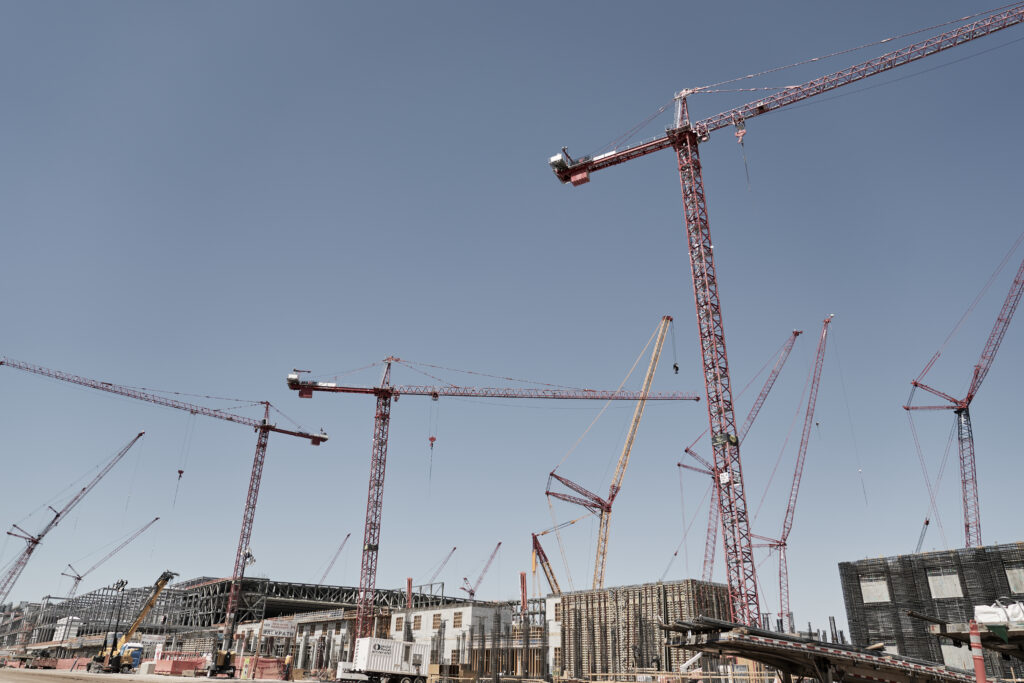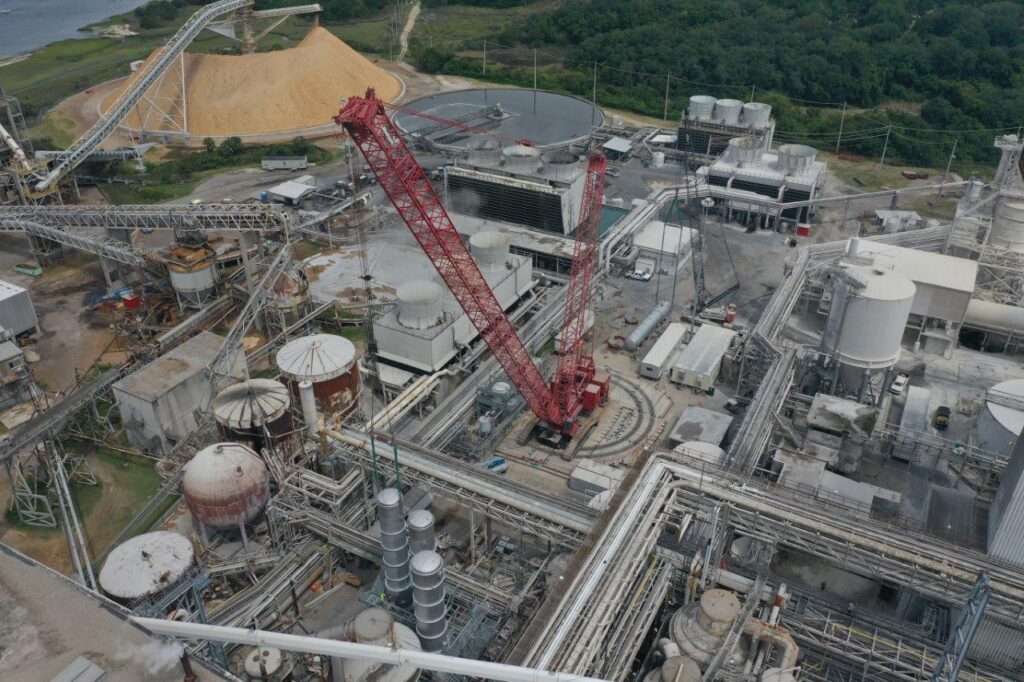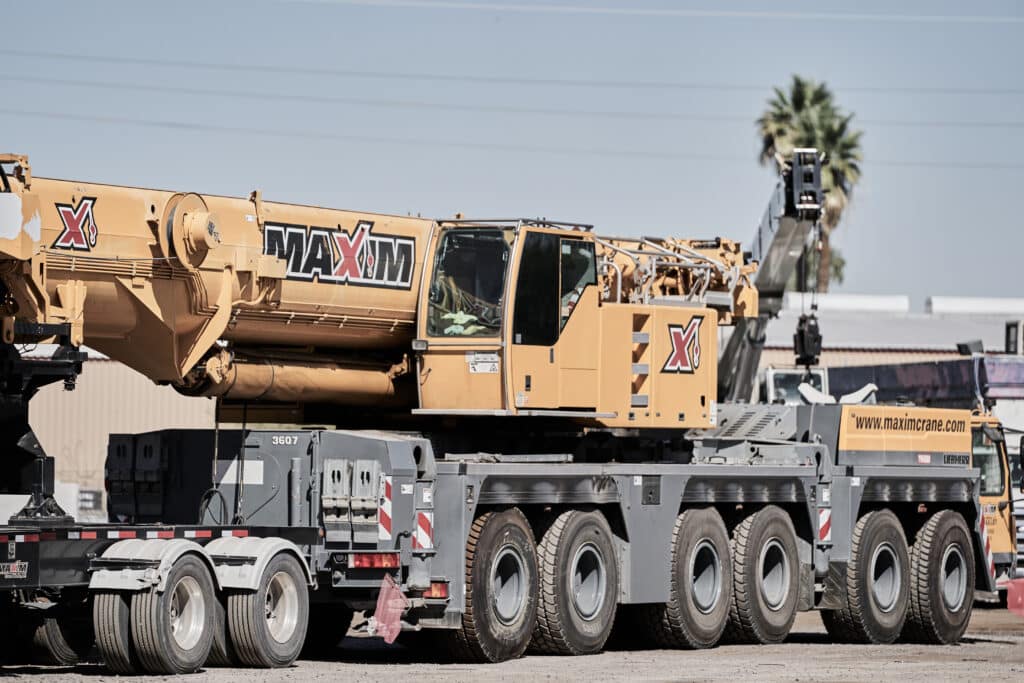When renting a crane and comparing crane rental companies, costs always become part of the conversation. While the cost of renting a crane is only one factor to consider as you assess crane rental providers, understanding the variables that impact costs is important. However, keep in mind that not all crane companies are created equal. Make sure that you understand the scope of services, overall capabilities, and ease of doing business when comparing crane rental companies to ensure you’re getting the best overall value for your job site.
Coming up with a range of costs for a crane rental may sound easy. While cranes can be rented on an hourly, daily, or monthly basis, getting to ballpark pricing is difficult given all the complexities and factors that go into a crane rental and your job site. Outlined below are factors that influence the price of renting a crane.
Factors That Influence Crane Rental Costs
How much does renting a crane cost? While renting a crane may be cheaper than buying one, crane rental costs may vary for the following reasons.
Crane Type
Crane rental costs depend on the type, size, and configuration of the crane you need for your project. The lift weight and radius must both be considered to determine the best type, size and configuration crane for a given project.
Consulting a crane professional is always the best way to make sure you’re getting the right crane for the job. Given the variety of crane types, sizes, and configurations, it can be difficult to understand which crane and configuration works for your lift. Larger cranes may have higher lifting capacities and therefore can perform lifts below that lifting capacity, so you want to make sure that you don’t overpay for a large crane that can do your lift when a smaller, more cost efficient one will do. Crane professionals like those at Maxim Crane can make sure you get the crane you need, not the crane that will do the job at a higher cost.
Labor Requirements
When renting a crane, consider the professionals you need to hire to operate your crane. You’ll need everything from transportation and logistics coordination to personnel to operate the crane and truck drivers to deliver the crane. You’ll also need qualified technicians to maintain the crane while it’s on the job site (i.e. oil changes, lubes, etc.) You’ll need someone to coordinate the logistics of the job site as well. The amount of labor needed to properly execute a project can be overwhelming and it needs to be factored into the overall cost.
There are typically two types of crane rentals; bare rentals and operated and maintained rentals. When you choose a rental company like Maxim Crane, opting for the operated and maintained rental means that the company takes the work off your hands by coordinating transportation, assembly, and dismantlement; the hiring of certified operators and service personnel; and providing the necessary insurance coverage, which allows you to focus on other aspects of your job.
Choosing an operated and maintained rental eases several burdens and offers a turnkey solution for your crane rental. When comparing pricing for bare rentals vs. operated and maintained, consider the time and effort saved and the value created for your job site when you hire a crane rental company to do it all for you.
Bare rentals, while more economical on the surface, leave you responsible for the coordination and management of licensed operators for the crane & providing the necessary insurance coverage. Once you add in those costs and consider the time you may spend hiring labor, an operated and maintained rental may become a more efficient choice.
Project Duration
The duration of time required for the crane to be on a job site also influences the cost of a crane rental. Some construction projects will need a crane for a small section of the work and may only require a few hours with the crane, while others need it for the entire project duration which could be years. Depending on your job demands, you can rent a crane:
- Hourly
- Daily
- Weekly
- Monthly
As a full-service crane rental company, Maxim Crane, will consult with you to make recommendations based on your unique needs and the duration of your project.
Transportation/Hauling Requirements
Getting the crane and all its parts from point A to point B can be complex, especially if you’re delivering multiple cranes and multiple loads to a job site. The number of truckloads required, state government permits, and distance traveled are all transportation-related items that impact the overall cost of a crane rental.
Not to mention the personnel and logistical coordination needed to ensure the equipment is delivered correctly and on time. When comparing your crane rental options, keep transportation in mind and make sure the rental company you choose has the capability and expertise to manage the transportation aspect of the rental.
Crane rental providers, like Maxim Crane, with locations and equipment depots all over the United States can help share in the economies of scale of a national branch footprint, creating efficiencies and value that companies with smaller fleets and fewer locations can’t match.
Project Management Services
Once you rent a crane, it is helpful to have a project manager to advise from the beginning to the end of the project. Project management involves assisting in creating a site and logistics plan based on resources, budget, and timeline.
Involving a project management team from the crane rental company ensures timely delivery and assembly of the rented cranes, but not all crane rental companies provide this service. Consider the project management needs of your lift and consult with your crane rental provider on their capabilities to assist you with project management services. Some crane rental companies offer this service as part of the crane rental, while others offer it as an additional line item or simply don’t offer the service at all.
Engineering Services
Developing lift plans to ensure the safe operation of the crane and a successful lift is an invaluable tool. Engineering services from a crane rental company aim to improve operation safety, better productivity, and overall better planning for your project. Highly experienced engineers and engineering services offer peace of mind by helping develop lift plans specific to your job and working with sales, logistics, and service to make your lift that much more efficient.
Like project management services, some crane rental companies offer engineering services, and some don’t. While there may be additional costs associated with selecting engineering services for your lift, the value created by handing off this aspect of the lift is hard to put a price on. When comparing quotes, be sure to ask if engineering services are included in the price.
Popular Cranes to Consider
To determine which crane would be most suitable for the job you’re looking to do, it’s important to know the types of cranes available. Fleet size becomes increasingly important when looking at the impact on costs. Companies with more varieties of cranes across a larger fleet have an edge in making sure the crane type you need is available when you need it.
Depending on your lift requirements, your crane rental company may recommend one or more of the crane types listed below.
Tower Crane

Tower cranes are a staple on construction sites due to their ability to lift heavy materials to significant heights, especially in environments where space constraints prevent the use of larger mobile cranes. These cranes can be anchored to the ground or mounted on ballasted bases, making them versatile for different site requirements. One of their key advantages is height adaptability; as construction progresses, tower cranes can be tied to structures or extended with additional components to reach higher elevations, making them ideal for tall building projects.
Tower cranes are typically used for long-term projects, often remaining on-site for several months or even longer. This extended presence allows them to efficiently handle repetitive, heavy lifting tasks throughout the project’s duration. However, their deployment involves complex logistics. They usually require multiple truckloads for delivery, and additional cranes might be necessary for their assembly and eventual dismantling. These factors contribute to the tower crane rental costs and are an important consideration in project planning.
Moreover, due to their comprehensive capabilities and the complexity of their installation, the overall value they bring to large-scale and height-intensive projects often justifies these costs.
Carry Deck Crane
Carry deck cranes are versatile and compact, making them ideal for jobs in confined spaces like industrial plants. They excel in environments that require maneuverability and are commonly used in tasks such as bridge construction and general infrastructure projects.
These cranes are designed for easy transportation, typically delivered to job sites via semi-truck, which allows for quick deployment and setup. Their operational efficiency and flexibility mean that they are often rented for shorter periods, such as hours or days, to complete assignments that demand agility and speed.
When considering a carry deck crane rental, transportation logistics play a significant role in the overall cost. Though smaller than many other crane types, ensuring efficient delivery and setup is crucial for maximizing their utility on a job site. Their mobility and adaptability make them an excellent choice for site managers seeking efficient lifting solutions in space-restricted areas and for projects requiring rapid completion.
Crawler Crane

Crawler cranes are highly suited for projects requiring the lifting of extremely heavy loads, making them a preferred choice on large commercial construction sites and in industries like renewable energy and energy production facilities. Known for their impressive lifting capacity, crawler cranes are essential in situations that demand significant weight handling.
These cranes come equipped with various components, such as different boom sizes, jibs, and counterweights, allowing them to tackle diverse lifting tasks. Transporting these components to a job site often requires multiple truckloads and sometimes additional cranes for their assembly. The preparation of the lifting surface is another crucial aspect, as crawler cranes need a stable platform, often referred to as a “dance floor,” to ensure safe operation.
The costs associated with deploying a crawler crane can vary widely, influenced by the size of the crane, the complexity of transportation, and the site preparation needs. Maxim Crane assists clients from start to finish, ensuring the right crawler crane option is selected for the job and overseeing the meticulous logistics involved in its deployment. Despite the complexity, crawler cranes provide unmatched power and efficiency for projects demanding heavy-duty performance.
All-Terrain Crane
All-terrain cranes are known for their exceptional versatility, combining robust off-road capabilities with the ability to travel on highways at high speeds. This dual functionality makes them a highly efficient choice for projects that require mobility across diverse terrains.
One of the standout features of all-terrain cranes is their adaptability to different site conditions, providing superior maneuverability on rough terrain while maintaining excellent performance on paved roads. This makes them ideal for a wide range of projects where site accessibility and quick relocation are key considerations.
When planning a rental, it’s important to account for potential additional truckloads needed for transporting components such as counterweights and jibs. Despite these logistical considerations, the all-terrain crane’s combination of power and flexibility often results in cost savings, as it reduces the need for specialized transport arrangements.
Overall, all-terrain cranes offer a practical and economical solution for projects that demand a versatile, mobile crane capable of handling both rugged work sites and urban environments with ease.
Hydraulic Truck Crane

Hydraulic truck cranes are highly versatile and are utilized in a variety of projects, both short-term and long-term. Their design allows them to travel easily over roads, simplifying transportation logistics and making them a convenient choice for many job sites.
These cranes are well-suited for jobs that require frequent relocation, as their over-the-road capabilities allow them to move between locations with minimal setup time. However, depending on the specifics of the job, additional components like booms, jibs, and counterweights may be necessary, potentially requiring extra truckloads and logistical coordination.
When planning for a hydraulic truck crane rental, efficient logistics management is crucial to ensure timely delivery and assembly of all necessary parts. Their adaptability and ease of transport make them an attractive option for project managers who require a reliable lifting solution that can quickly adapt to changing site demands and conditions.
Rough Terrain Crane
Rough terrain cranes are specifically designed for challenging work environments where standard truck-mounted cranes may struggle. These cranes are equipped to handle off-road conditions efficiently, making them ideal for construction projects in rugged or uneven terrain.
Key features of rough terrain cranes include a wide wheelbase, robust tires, and high ground clearance, which provide stability and ease of movement over difficult landscapes. The incorporation of power steering and all-wheel drive further enhances their handling capabilities, ensuring precise maneuverability on even the toughest job sites.
In terms of logistics, rough terrain cranes are typically transported to job sites via semi-truck, and any additional components required for operation will also need careful coordination for delivery. Understanding these transportation needs is crucial for cost planning when renting a rough terrain crane.
Overall, the specialized design of rough terrain cranes makes them a valuable asset for projects that demand reliable performance in challenging environments, offering the stability and mobility necessary to complete tasks safely and efficiently.
Why Renting a Crane Is the Best Option
Despite all the factors that go into crane rental pricing, renting a crane along with additional services may be less expensive than owning a crane outright, especially over the long-term. This is especially true when you take maintenance and repairs over the life of the machine into consideration.
Also, purchasing a crane means that you’re limited to its specifications and capacities. Each crane has specific functions, so you can’t use it for lifting on a variety of projects — you can only use it on projects it’s designed to tackle. That huge investment may be hard to justify.
By renting a crane, you can get the type that meets your specific needs on any project. To keep operational expenses low, consider renting cranes for specific jobs only when you need them. You’ll escape the stress of owning and operating a crane.
Search For Value from Your Crane Rental Provider
With all the variables that go into crane rental rates, you’ll need to engage a reliable rental company that can advise you on the appropriate crane for your project, advise on the requirements of your lift, and plan logistics accordingly. A company like Maxim Crane Works specializes in the rental of cranes and heavy lift equipment, including rough terrain cranes, tower cranes, crawler cranes, hydraulic truck cranes, and other conventional truck cranes.
As a one-stop-shop company, we also provide a turn-key solution, offering project management, engineering, maintenance, and heavy haul services in one company and through a local single point of contact, so that you can focus on managing other aspects of your project.
Reach out to us today for a smooth crane operation on your next project.



